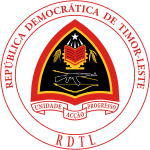| History of East Timor |
|---|
 |
| Chronology |
| Topics |
|
|
| Part of a series on the |
| Culture of East Timor |
|---|
 |
| History |
| People |
| Languages |
| Cuisine |
| Religion |
| Art |
| Literature |
| Music |
| Sport |
East Timor, officially the Democratic Republic of Timor-Leste, is a country in Southeast Asia and Oceania. The country comprises the eastern half of the island of Timor and the nearby islands of Atauro and Jaco. The first inhabitants are thought to be descendant of Australoid and Melanesian peoples. The Portuguese began to trade with Timor by the early 16th century and colonised it throughout the mid-century. Skirmishing with the Dutch in the region eventually resulted in an 1859 treaty for which Portugal ceded the western half of the island. Imperial Japan occupied East Timor during World War II, but Portugal resumed colonial authority after the Japanese surrender.
East Timor declared itself independent from Portugal in 1975, but was invaded by Indonesia. The country was later incorporated as a province of Indonesia. During the subsequent two-decade occupation, a campaign of pacification ensued. Although Indonesia did make substantial investment in infrastructures during its occupation in East Timor,[1] dissatisfaction remained widespread. From 1975 to 1999, there were an estimated 102,800 conflict-related deaths (approximately 18,600 killings and 84,200 'excess' deaths from hunger and illness), the majority of which occurred during the Indonesian occupation.
In 1999, in a UN-sponsored referendum, an overwhelming majority of East Timorese voted for independence from Indonesia. Immediately following the referendum, anti-independence Timorese militias – organised and supported by the Indonesian military – commenced a scorched earth campaign. The militias killed approximately 1,400 Timorese and forcibly pushed 300,000 people into West Timor as refugees. The majority of the country's infrastructure was destroyed during this attack. The International Force for East Timor (INTERFET) was deployed to the country and brought the violence to an end. Following a United Nations-administered transition period, East Timor was internationally recognised as an independent nation in 2002. It is the poorest country in Southeast Asia with a 20% unemployment rate, and approximately one third of the population is illiterate.
- ^ Singh, Udai Bhanu. "Indonesia: From Economic Crisis to Political Turmoil". www.idsa-india.org. Archived from the original on 2 April 2012. Retrieved 11 November 2011.